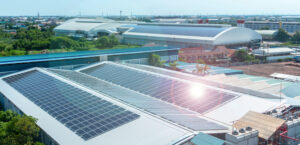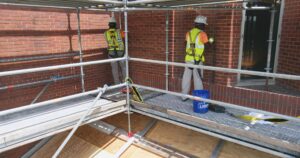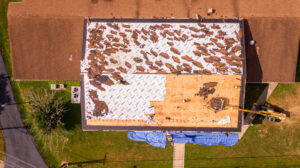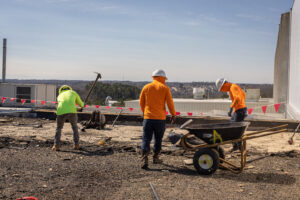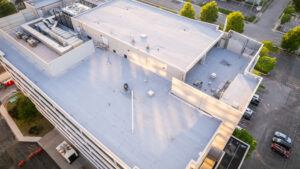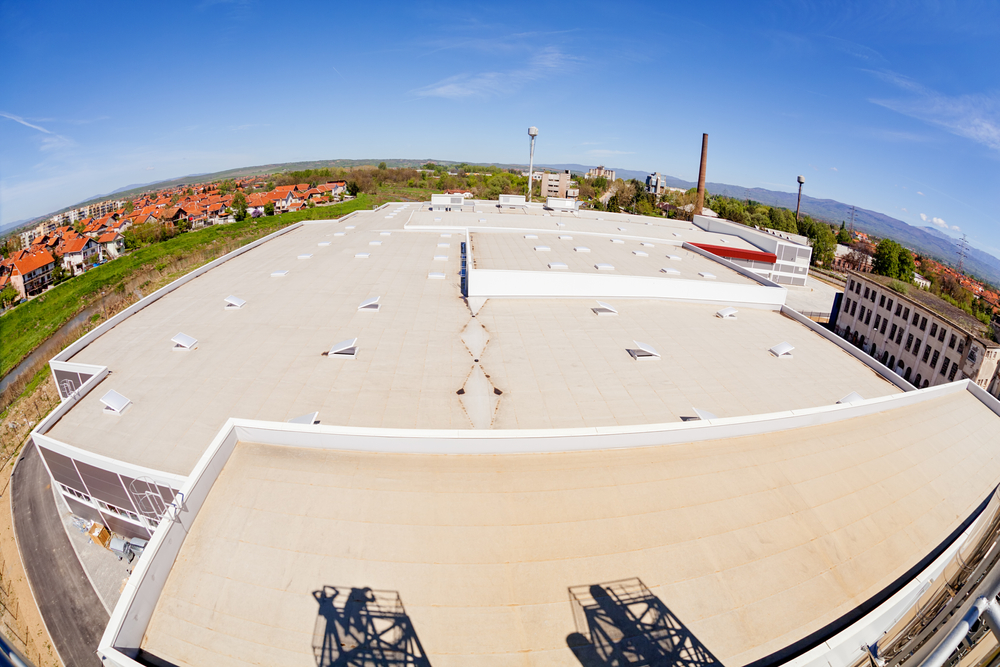
Whether you are a commercial business owner looking for a new roof for your establishment or are just curious about the different types of commercial flat roofs available, you have come to the right place. In this blog post, we’ll go over five of the best commercial flat roof types currently available. Each has its unique benefits & drawbacks, so read on to learn more!
Modified Bitumen Roofing (Mod Bit or MB)
Modified Bitumen Roofing is a single-ply roof membrane composed of asphalt and reinforcement materials. It can be installed in hot and cold climates, making it a versatile option for many businesses. MB roofs are typically torch-applied, meaning the installer uses a propane or natural gas torch to melt the asphalt and adhere it to the substrate. This technique results in a very durable roofing with higher seal resistance to water infiltration.
Pros of Modified Bitumen Roofing:
- Durable and weather-resistant
- It works well in both cold & hot weather conditions.
- Available in a variety of colors to match your building’s aesthetics
- It has heat-reflective properties to keep your building cooler in the summer
Cons of Modified Bitumen Roofing:
- Torch-applied installation can be dangerous if not done correctly
- Requires regular maintenance to ensure longevity
Lifespan of MB roofs: 15-20 years
EPDM Roofing
Ethylene propylene diene monomer (EPDM) is an extremely durable rubber roofing membrane. It is widely used in commercial flat roofs and comes in both black and white colors. EPDM can be installed either fully adhered, mechanically attached or ballasted with the seams sealed with liquid adhesives or special tape. Seaming and detailing are quick, easy, and dependable. The various membranes like factory-applied tape make the installation process quicker.
Pros of EPDM Roofing:
- EPDM roofs have a long lifespan and are very durable
- They are flexible and resistant to tears and weathering, making them ideal for climates with harsh weather conditions
- Low-cost roofing option
- Installation is quick and easy, resulting in fewer labor costs
Cons of EPDM Roofing:
- The initial cost of installing EPDM roofing is more expensive than other types of roofing materials.
- The material can be damaged by sharp objects or hailstones
- It is not as fire-resistant as some other roofing materials
- When EPDM roof materials come into contact with petroleum-based products, it corrodes.
If you’re considering EPDM as one of your options for a flat roof, you might want to learn about the Advantages and Disadvantages of EPDM Roofing in detail.
Lifespan of EPDM roofs: 30- 50years
PVC Roofing
Polyvinyl Chloride (PVC) roofing, also known as vinyl roofing, is a popular option for both new and replacement commercial roofing projects. PVC roofs are made from flexible membranes that are thermoplastic, meaning they can be heated and molded into shape. This makes them a great choice for roofs with complex shapes and curves.
PVC roofing is available in both single-ply and sheet membrane forms. Single-ply PVC roofing is made from a single layer of PVC material, while sheet membrane PVC roofing consists of multiple layers of PVC sheets that are bonded together to create a watertight seal. Sheet membrane PVC roofs are generally more durable than single-ply roofs and can withstand extreme weather conditions.
Pros of PVC Roofing:
- Used in waterproofing applications
- Energy-efficient roofing option
- resistant to UV radiations, hail, wind, and fire
- available in a variety of colors to match your building’s aesthetic
Cons of PVC Roofing:
- When installing a PVC roof, existing roofs must be removed. This may need more time and money than expected.
- PVC isn’t well-suited to extremely cold conditions.
Lifespan of PVC roofs: 20 – 30 years
TPO
Thermoplastic polyolefin (TPO) single-ply roofing is a very popular choice for green buildings. It is made of recycled materials, has no plasticizers added, and has very low degradation under UV radiation. TPO materials are available in white, grey, and black and can be fully adhered, mechanically fastened, or ballasted.
Pros of TPO Roofing:
- A variety of colors complement the property owner’s preferences.
- It has excellent resistance to ozone, UV light, and other chemical exposure.
- Fire-resistant
- Suitable for green roofs
- Naturally flexible
- Economical than PVC roofing
- Energy-efficient and eco-friendly roofing option
Cons of TPO Roofing:
- Requires high-quality installation for seams to hold up for a long time.
- TPO Roof repair is expensive because it requires the use of high-end tools like heat welders.
Lifespan of TPO roofs: 15 to 20 years
Built-Up Roofs (BUR)
Built-up roofs, also known as BURs, are one of the oldest commercial roofing types. They consist of multiple layers of reinforcing plies and asphalt, which form a redundancy of waterproofing layers.
Pros of Built-up roofs (BUR) Roof
- Built-up roofs are a great option for all seasons. The roof layering offers superb waterproofing and prevents water from entering the structure.
- BUR roofs are less expensive than other roofing options.
- The asphalt and gravel on top of the roofing membrane create an extra layer of insulation. It helps keep your building cooler in the summer and warmer in the winter.
- They need lower maintenance and have a long lifespan.
Cons of Built-up roofs (BUR)
- They can be heavy and require a lot of support.
- The installation process is complicated and requires a high level of expertise.
- Finding leaks and mold remediation can be difficult.
- BUR roofs are not as environmentally friendly as other roofs. The asphalt surface emits toxic greenhouse gases during installation contributing to air pollution.
Lifespan of BUR roofs: 20-30 years
Learn more about our Built-Up Roofing maintenance services.
There are many different types of flat commercial roofs, and the best type for your business will depend on your specific needs. We’ve outlined 5 of the most popular types of flat roofs to help you get started in your research. If you need more information on commercial roofing or want help deciding which roof is right for your business, Contact Eskola Commercial Roofing Company. Today. Thanks for reading!
Evaluate the potential of commercial solar roofing systems to enhance your building’s efficiency and value.

